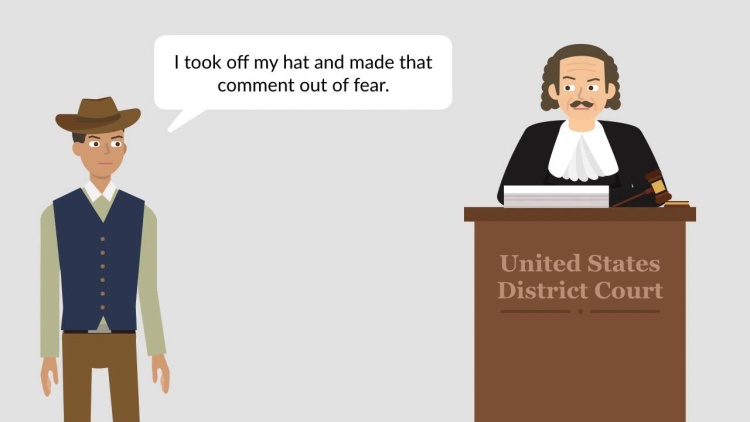Hicks v. United States
United States Supreme Court
150 U.S. 442 (1893)
- Written by Craig Conway, LLM
Facts
John Hicks (defendant) and Andrew Colvard were riding on horseback. Hicks and Colvard saw Stand Rowe (defendant) sitting on his horse with a rifle in his lap. Colvard rode up to Rowe, leaving Hicks 30 to 40 feet behind. Colvard and Rowe had a discussion. During that time, Rowe raised his rifle, pointed it at Colvard, and then lowered it on two different occasions while Hicks laughed aloud. Then, according to witnesses, Hicks said to Colvard, “[T]ake off your hat, and die like a man.” Rowe then raised his rifle a third time and pointed it at Colvard. Rowe fired the rifle, and Colvard was killed. Rowe and Hicks rode off together. Both Hicks and Rowe were charged with murder, but Rowe was killed prior to trial. At trial, Hicks testified that he had not encouraged Rowe to shoot Colvard and, in fact, that he had tried to discourage Rowe from shooting. Additionally, Hicks testified that the only reason he rode away with Rowe was out of fear for his own life. The trial judge instructed the jury that Hicks’s presence at the time and place of the killing was not enough, on its own, to find him guilty of murder. However, if the jury found that Hicks was present at the shooting and aided, abetted, or encouraged Rowe in some way, then he could be found to be a participant in the crime the same as if he had actually fired the shot that killed Colvard. The judge further instructed the jury that if Hicks was present at the shooting with the purpose of aiding, abetting, advising, or encouraging the shooting but he did not actually do any of those things because his assistance was unnecessary, he could still be found guilty. With respect to Hicks’s statements at the time of the killing, the trial judge told the jury that if someone’s “deliberate and intentional use of words” had the effect of encouraging someone to kill another person, then the law would presume the speaker intended the words to have that effect, and the speaker would therefore be responsible. Hicks was convicted, and he appealed.
Rule of Law
Issue
Holding and Reasoning (Shiras, J.)
What to do next…
Here's why 907,000 law students have relied on our case briefs:
- Written by law professors and practitioners, not other law students. 47,100 briefs, keyed to 996 casebooks. Top-notch customer support.
- The right amount of information, includes the facts, issues, rule of law, holding and reasoning, and any concurrences and dissents.
- Access in your classes, works on your mobile and tablet. Massive library of related video lessons and high quality multiple-choice questions.
- Easy to use, uniform format for every case brief. Written in plain English, not in legalese. Our briefs summarize and simplify; they don’t just repeat the court’s language.





